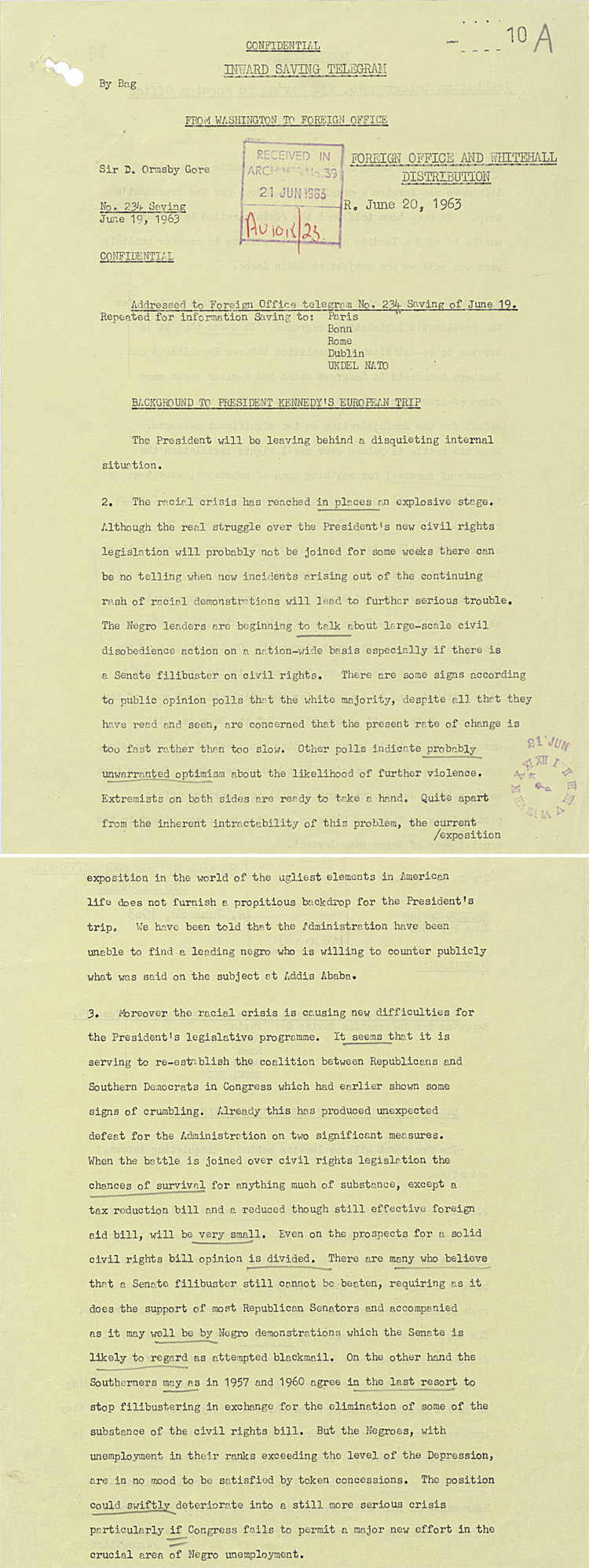
Telegram from UK Ambassador in Washington (David Ormsby Gore) to Foreign Office, 20th June 1963 (FO 371/168411)
Transcript
CONFIDENTIAL
INWARD SAVING TELEGRAM
By Bag
FROM WASHINGTON TO FOREIGN OFFICE
Sir D. Ormsby Gore
FOREIGN OFFICE AND WHITEHALL DISTRIBUTION
No. 234 Saving
June 19, 1963
R. June 20, 1963
CONFIDENTIAL
Addressed to Foreign Office telegram No. 234 Saving of June 19.
Repeated for information Saving to:
Paris
Bonn
Rome
Dublin
UKDEL NATO
BACKGROUND TO PRESIDENT KENNEDY’S EUROPEAN TRIP
The President will be leaving behind a disquieting internal situation.
2. The racial crisis has reached in places an explosive stage. Although the real struggle over the President’s new civil rights legislation will probably not be joined for some weeks there can be no telling when new incidents arising out of the continuing rash of racial demonstrations will lead to further serious trouble. The Negro leaders are beginning to talk about large-scale civil disobedience action on a nation-wide basis especially if there is a Senate filibuster on civil rights. There are some signs according to public opinion polls that the white majority, despite all that they have read and seen, are concerned that the present rate of change is too fast rather than too slow. Other polls indicate probably unwarranted optimism about the likelihood of further violence. Extremists on both sides are ready to take a hand. Quite apart from the inherent intractability of this problem, the current exposition in the world of the ugliest elements in American life does not furnish a propitious backdrop for the President’s trip. We have been told that the Administration have been unable to find a leading negro who is willing to counter publicly what was said on the subject at Addis Ababa.
3. Moreover the racial crisis is causing new difficulties for the President’s legislative programme. It seems that it is serving to re-establish the coalition between Republicans and Southern Democrats in Congress which had earlier shown some signs of crumbling. Already this has produced unexpected defeat for the Administration on two significant measures. When the battle is joined over civil rights legislation the chances of survival for anything much of substance, except a tax reduction bill and a reduced though still effective foreign aid bill, will be very small. Even on the prospects for a solid civil rights bill opinion is divided. There are many who believe that a Senate filibuster still cannot be beaten, requiring as it does the support of most Republican Senators and accompanied as it may well be by Negro demonstrations which the Senate is likely to regard as attempted blackmail. On the other hand the Southerners may as in 1957 and 1960 agree in the last resort to stop filibustering in exchange for the elimination of some of the substance of the civil rights bill. But the Negroes, with unemployment in their ranks exceeding the level of the Depression, are in no mood to be satisfied by token concessions. The position could swiftly deteriorate into a still more serious crisis particularly if Congress fails to permit a major new effort in the crucial area of Negro unemployment.
CONFIDENTIAL
